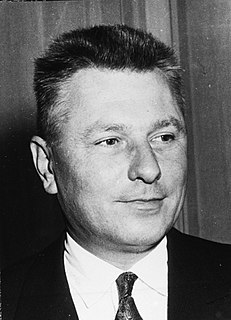A trade union is an association of workers forming a legal unit or legal personhood, usually called a "bargaining unit", which acts as bargaining agent and legal representative for a unit of employees in all matters of law or right arising from or in the administration of a collective agreement. Labour unions typically fund the formal organization, head office, and legal team functions of the labour union through regular fees or union dues. The delegate staff of the labour union representation in the workforce are made up of workplace volunteers who are appointed by members in democratic elections.
Anarcho-syndicalism is a political philosophy and anarchist school of thought that views revolutionary industrial unionism or syndicalism as a method for workers in capitalist society to gain control of an economy and thus control influence in broader society. Syndicalists consider their economic theories a strategy for facilitating worker self-activity and as an alternative co-operative economic system with democratic values and production centered on meeting human needs.

The politics of Belgium take place in the framework of a federal, representative democratic, constitutional monarchy. The King of the Belgians is the head of state, and the Prime Minister of Belgium is the head of government, in a multi-party system. Executive power is exercised by the government. Federal legislative power is vested in both the government and the two chambers of parliament, the Senate and the Chamber of Representatives. The federation is made up of (language-based) communities and (territorial) regions. Philippe is the seventh and current King of the Belgians, having ascended the throne on 21 July 2013.
The Barbados Labour Party (BLP) is the main party of government of Barbados which was established in 1938. Led by Prime Minister Mia Amor Mottley, the BLP holds 29 of the 30 seats in the House of Assembly of Barbados after MP for St. Michael West, Joseph Artherly decided to become an Independent MP and became the Leader of the Opposition. It was elected to government on 25 May 2018 after 10 years in opposition, with Mottley becoming the country's first female Prime Minister.

The Unión General de Trabajadores is a major Spanish trade union, historically affiliated with the Spanish Socialist Workers' Party (PSOE).
Marie Louise "Mia" De Vits is a Belgian politician.

The Confederación Nacional del Trabajo is a Spanish confederation of anarcho-syndicalist labour unions, which was long affiliated with the International Workers' Association (AIT). When working with the latter group it was also known as CNT-AIT. Historically, the CNT has also been affiliated with the Federación Anarquista Ibérica ; thus, it has also been referred to as the CNT-FAI. Throughout its history, it has played a major role in the Spanish labor movement.

Renardism refers to a political ideology in Belgium based on the thinking of the trade union leader André Renard (1911–62). Popular in parts of Wallonia, Renardism combined elements of syndicalism and regionalist politics. It ultimately sought the transformation of Belgium into a federal state.

André Renard was a Belgian trade union leader. Influential within the Walloon Movement and left-wing circles, Renard would give his name to a political ideology known as Renardism.

The general strike over the winter of 1960–61, known popularly in Wallonia as the Strike of the Century, was a major series of strikes in Belgium which began on 14 December 1960 and lasted approximately six weeks. The strike was instigated by the militant trade union, the General Federation of Belgian Labour (FGTB-ABVV), against an attempt by the government of Gaston Eyskens to improve the state of Belgium's public finances by introducing a series of austerity measures known as the Loi Unique or Eenheidswet. Although the strike began across Belgium, it soon lost momentum in Flanders where workers returned to work after a few days, leaving those in Wallonia, a region already starting to experience deindustrialization, on their own.

The Royal Question was a major political crisis in Belgium that lasted from 1945 to 1951, coming to a head between March and August 1950. The "question" at stake surrounded whether King Leopold III could return to the country and resume his royal duties as King of the Belgians amid allegations that his actions during World War II had gone contrary to the provisions of the Belgian Constitution. It was eventually resolved by the abdication of Leopold in favour of his son, Baudouin, in 1951.

Since 1893, there have been a number of general strikes in Belgium. Occasioned by the emergence of the labour movement and socialism in Belgium, general strikes have been an enduring part of Belgian political life. Originally intended to encourage the reform of the franchise, more recent strikes have focused on issues of wages and opposition to government austerity. Since 1945, general strikes have been co-ordinated by the General Federation of Belgian Labour (ABVV-FGTB), a federation of Socialist trade unions, while most before World War II were organised by the parliamentary Belgian Labour Party (POB-BWP).
Ernest Burnelle was a Belgian politician, member of the Communist Party of Belgium (PCB), and part of the Walloon Movement.
Events in the year 2018 in Belgium.
The Union of Mineworkers of Belgium was a trade union representing coal miners in Belgium.

Georges Debunne was a Belgian trade union leader.
The Union of Clothing Workers and Kindred Trades in Belgium was a trade union representing workers in the clothing industry in Belgium.
Roger Dekeyzer was a Belgian trade union leader.
The Union of Belgian Metalworkers (Dutch: Centrale der Metaalindustrie van België, CMB; French: Centrale de l´Industrie du Métal de Belgique is a trade union representing workers in metal and related trades in Belgium.
The General Union of Public Services is a trade union representing public sector workers in Belgium.








